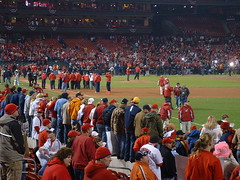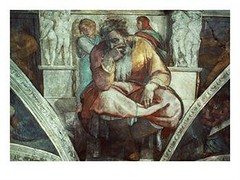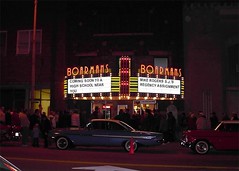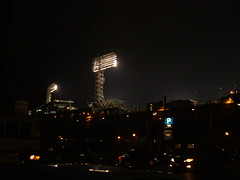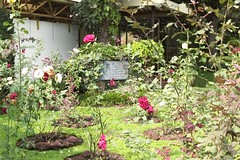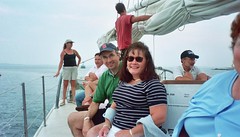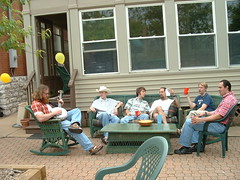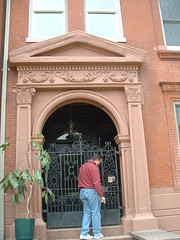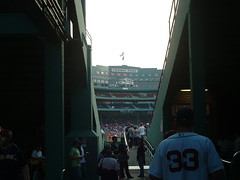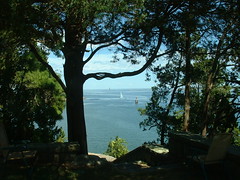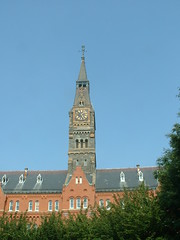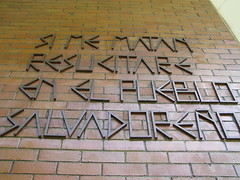
"If they Kill me, I will Arise in the Salvadoran People"
-Oscar Romero (from outside the U.C.A. Chapel)
Photo by Laura Hershberger
Prophets of a Future Not Our Own: A Reflection Given at Georgetown University Hospital Chapel. August 4, 2006.
Scripture:
Deuteronomy 34
Psalm 30
John 21
Prayer/Poem "Prophets of a Future Not Our Own" attr. to Archbishop Oscar Romero
There is a sense of liberation in knowing we cannot do everything. We are ministers, not messiahs, workers, not master builders. At some point for each of us there is a moment where we have to leave behind a project, a job, a way of life, in order to carry on to whatever the next stage may be. For some of us, very practically here, this means that at the end of these next few weeks we will leave our jobs as chaplains here in the hospital and move to carry on our ministry elsewhere. For some watching or listening, this may mean very practically that what has happened in the context of your being here in the hospital, whether it is illness, surgery, birth, or death has changed your lives to such an extent that you will not, cannot go back from where you came.
We can mourn this part of our lives just as much as anything else, and we should though we may also look ahead and see the work that will be done, but will not be for us to do. In our reading from Deuteronomy, Moses looks into the holy land, the fulfillment of his prophetic longings, but does not, cannot, enter in. Of course scripture points to this being punishment for having doubted God, but there is more at stake here. The kingdom of God, the story of our salvation, both supersedes any one man and is at the same time fully realized in one man, who was also God. We are not God though. Moses, the greatest of the prophets, was not God. In truth we carry nothing to completion, but each event finds its fruition in the community of believers that we gather around us as the people of God. For Moses the realization of his dream was a realization through his progeny, which was a free community of God’s chosen people now coming into the inheritance God had promised them. For many of us it may be the same, and often it is the case with the greatest who walk among us, those men and women like Moses, Martin Luther King Jr., and the author of the poem which is at the center of this reflection, Oscar Romero, we too might just be able to walk to the Jordan, but not cross over. The future we prophesy is so often not our own, and often the world which we try to create is one which is just a little better, a little more loving, a little more humane for our children, and their children, entrusting to them what was once entrusted to us, the gift to participate with God’s grace in the shaping of the kingdom of God on earth as it is in heaven.
The Psalmist comes to us with a perspective which says that we can sometimes think that we shall never be shaken. But we know better, for people who are sick and in the hospital very often it seems as if God seems to be hidden, and that the best of our efforts in life, because of illness or injury will ultimately come to nothing, that with the psalmist we might ask “will my life blood come to nothing?” We have hope in God though, and it can be in just that recognition of our relationship with God which is made manifest in crying out for mercy for whatever humble, broken, offering we make of our lives in which we can allow God to show us his mercy, his love, and that we can know that our incomplete offering is merely a step along the way, and an opportunity for God’s grace to enter in and do the rest in our lives.
We sometimes need to step back and look at the broader picture, because in context what little we accomplish in our lifetimes often makes a significant contribution to the building of the kingdom of God, and the seed we sow, though we may never reap it, bears fruit far beyond our imagination. There is a commitment in this to participate in the building of that kingdom for each of us; a commitment to participate in the sowing of the seed; a commitment to participate in the watering of that which is already planted. That commitment is the command of Christ to Peter that we hear in our Gospel reading, to love Christ is to feed his sheep and tend his flock. This is perhaps the only pastoral visit in recorded history which one could argue brings wholeness, Christ visiting Peter after the resurrection, the Messiah himself, brings forgiveness and a chance to amend his life to Peter to counter act the Peter’s denial of the kingdom in the face of the fear of the crucifixion that all Christ had said and done would be for naught. The resurrection stands as the surest hope, that life never really ends, it changes. The resurrection is the surest hope that in our weeping we will find joy. The resurrection is the surest hope that the seed which falls to the earth and dies lays dormant only for a while, only to see bountiful grain arise after the shoot which produced that seed is long gone. Yet there is, even in this, a sense that no life is completely filled, no life given its fullest meaning on its own merits. Jesus warns Peter: “Amen, amen, I say to you, when you were younger, you used to dress yourself and go where you wanted; but when you grow old, you will stretch out your hands, and someone else will dress you and lead you where you do not want to go." Even Peter, seemingly made whole by the work of Christ himself is left with a moment to ponder, that his work may never be full, may never be complete, and that in that moment of recognizing his limitation, there is the liberative moment of Christ’s words to him: “Follow Me.”
So it is for us, we may never see end results, and what we do may in the end be very incomplete. Still we minister; still we love, hoping for the kingdom which is beyond our vision. Still we plant and water the seeds which may not be our own, but in truth belong to future generations. Still we find meaning in our lives as incomplete as they may actually be, because we participate in something much larger than ourselves, and in this hope we prophesy of the kingdom of God, we prophesy of a future that is not our own.



